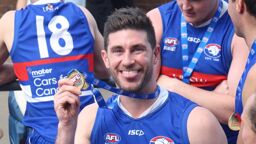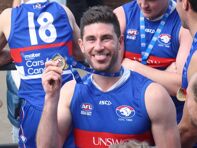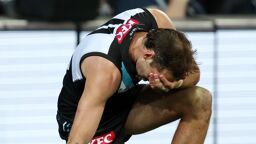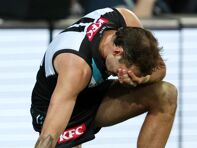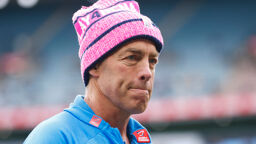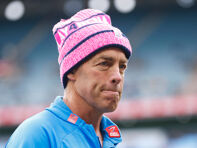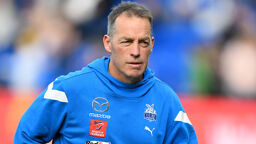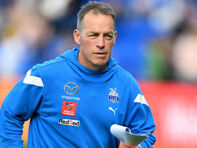The AFL has punished another player for using homophobic language on the field of play, with the league’s disciplinary chief Stephen Meade saying it is an “extremely disappointing” situation.
Wil Powell, a defender for the Gold Coast Suns, has been banned for five matches after admitting use of a slur during last Sunday’s defeat to the Brisbane Lions.
The Gold Coast Bulletin has reported that the 24-year-old called an opponent a “f****t” — the same insult that led to Port Adelaide’s Jeremy Finlayson being suspended last month for three matches.
That was a harsher punishment than had been handed down to North Melbourne coach Alastair Clarkson in February for uttering the word “c**ksucker” during an argument with St Kilda players in a pre-season game. Clarkson was fined AUS $20,000 but avoided a touchline ban.
Get off the sidelines and into the game
Our weekly playbook is packed with everything from locker room chatter to pressing LGBTQ sports issues.
Powell’s weekend misdemeanour hadn’t been publicly known until Thursday, with the Suns publishing a video of him delivering a profuse apology to camera alongside an official statement.
“I slipped a homophobic word on accident,” says Powell in the video. “I sincerely regret what I said that night and as soon as I said it, I was remorseful.
“I apologized to the Brisbane Lions player multiple times during the night and after the game via text. I’m extremely sorry for what I’ve said and it won’t ever happen again.”
Powell went on to apologize to “all the appropriate groups that it may affect” and said he was speaking “from the heart.” He also vowed to educate himself and claimed that he would seek support from his club and those around him to do that.
Suns CEO Mark Evans said: “Wil’s comment was completely unacceptable, and in no way reflects what we stand for as a football club.”
Due to scheduling, the earliest date Powell could return to AFL action is June 23. The Suns say they will “provide guidance and education for him during this time.”
The combination of mea culpa, a willingness to learn, and a suspension that also serves as a warning to other potential offenders feels like the right formula.
The players’ association, the AFLPA, agrees — but its CEO, Paul Marsh, is not entirely satisfied.
“Wil’s words are hurtful, offensive and don’t belong on or off the football field, and we acknowledge the impact these situations cause the LGBTIQA+ community,” said Marsh.
Directly referencing LGBTQ people is encouraging here, and preferable to the “all the appropriate groups” phrasing that Powell came up with (or was advised to say).
On the length of the ban, Marsh adds: “Given the AFL’s recent public position, we are not surprised by the size of this sanction, but we continue to believe the industry needs a formalised and consistent sanctioning framework. We have begun constructive discussions with the AFL about this.”
‘Deeply concerning’
Understandably, the AFLPA is already contemplating the next such occurrence. Would the suspension increase to seven games, in a logical sequence? Could the AFL Integrity Unit try a different approach within its “Conduct Unbecoming” framework, which has no set parameters?
The bigger picture here, it seems, is that this much-loved and very hypermasculine Australian institution is undergoing a reckoning. More evidence of that came this week from the West Australian Football League, a feeder league to the AFL, where East Perth’s Sam van Diemen received a four-game ban, later reduced to three, for directing a homophobic slur at an opponent.
Tellingly, none of this was mentioned on the club or league channels. “Neither East Perth nor the WAFL released any information about the suspension but it became apparent when van Diemen was omitted from the team that beat West Coast,” reported Sport FM.
On LGBTQ equality, Australia often appears to be striding ever forward. However, the seeming readiness of a few of those in its favorite sport to reach for anti-gay slurs is still holding everyone else back.
Related
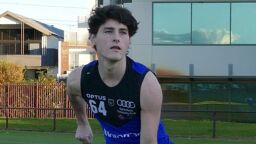
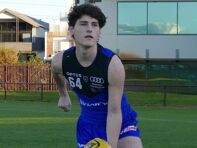
Homophobia strikes Australian rules football again as another player gets suspended for an on-field slur
Following Jeremy Finlayson’s suspension, East Perth’s Sam Van Diemen becomes the latest footballer to drop an anti-gay slur on the field.
By Ken Schultz | May 7, 2024
It’s also alarming when clubs and leagues at any level fail to carry news of these incidents, but the AFL can no longer avoid such scrutiny.
What might previously have been left on the field is now getting flagged to officials and acted upon. It feels like an effect of an ongoing culture shift.
The AFL has had a Pride Game since 2015 — but not yet a Pride round, unlike the women’s league — and several clubs now have LGBTQ fan groups such as Rainbow Crows and the Ruby Demons.
Mike O’Donnell, who plays in a Sydney league and is a rare voice on such matters in Aussie Rules as an out gay man, said on X: “Do we look at this as a rise in homophobic language in the AFL, or is it simply that these sort of comments are now being recognised for what they are?
“I suspect it’s the latter, but three within a season when the consequences have been made clear is deeply concerning.”
One X user asked O’Donnell why he thought players still use these words, given the potential consequences. He replied: “I suspect they just realise the power it holds and the impact it will have. The concern is it is still a “go-to” when they want to abuse someone.”
Later on Thursday, The Age reported that Powell had previously used anti-gay slurs on Instagram, publishing screenshots of comments he made three years ago on another player’s posts.
“Powell has commented “probably lost cos gay”, “you can’t surf gay”, “gay” and “pink looks good on you” under a series of images,” read the article.
“The Suns told this masthead that they wouldn’t be making an official comment on the social media posts, but that the language used by Powell will form the cornerstone of his education moving forward.”
The ugly side of social media
The endemic nature of AFL-related homophobia online was highlighted elsewhere this week by podcaster and TikTok influencer Scott O’Halloran, who revealed that around a decade ago, he had been in a long-term secret relationship with an AFL player.
O’Halloran said he was sharing the information to try to help people understand what closeted gay players may still be going through.
“We couldn’t even go out and get a latte together because of the sheer fear the both of us had of somebody pointing at the both of us saying, ‘oh my god, are you guys gay?’ he said on the Luke and Sassy Scott Podcast.
O’Halloran described the player as “a legend of the game” but that it was worrying “how scared he was to ever be found out for who he was, because of the homophobia in the game.
“The toxicity and homophobia is what ended our relationship. It was too much pressure on him. It was too much pressure on me.”
O’Halloran said he believed the player was out to some but not all of his AFL club teammates at that time. The debate around the Finlayson slur incident encouraged him to speak out about the culture in the sport, but he says he received “nothing but hate” when trying to address it online.
“The problem I find with this is the responsibility lies with the employer to look after and support their entire organisation,” he told the Fifi, Fev & Nick Show which goes out on Melbourne radio station The Fox.
“When I saw the hate that came my way, it just speaks volumes as to why no AFL player feels ready to come out.
“I know that if a gay AFL player would have seen the hate that I received for talking about it, they would have gone, ‘Oh, hell no, it’s not ready for someone to come out.’ It’s sad.”
There’s a balance that needs to be struck here. Clarkson, Finlayson and Powell are paying the penalty, and whether you agree with the severity of the sanctions imposed on them or not, the combo of punishment and deterrent is surely necessary.
But we shouldn’t be quick to state that such language is endemic throughout the sport. The vast majority of its players (and there are over 800 AFL pros), coaches and officials will have LGBTQ friends and family members that they love and appreciate, and will share Meade and the league’s disappointment.
However widespread it is, homophobia is an ugly and stubborn stain. It’s time the AFL took more of an all-game, all-level approach that really gets deeper into the roots and fibres. Educate everybody, not just the offenders.
Otherwise, Aussie rules will lurch from one punishment to the next, where the debate becomes ever more centered on the extent of bans and fines, and not the reasons why the worst of words still pop into the heads of players when they get wound up.






